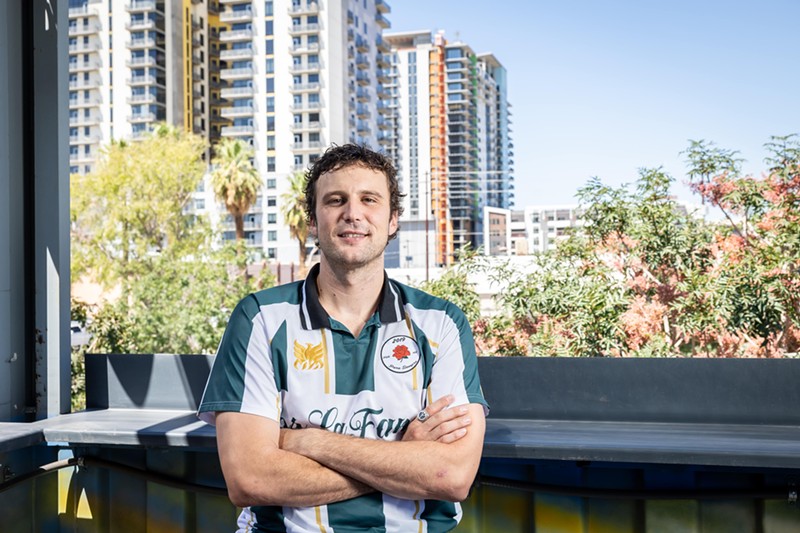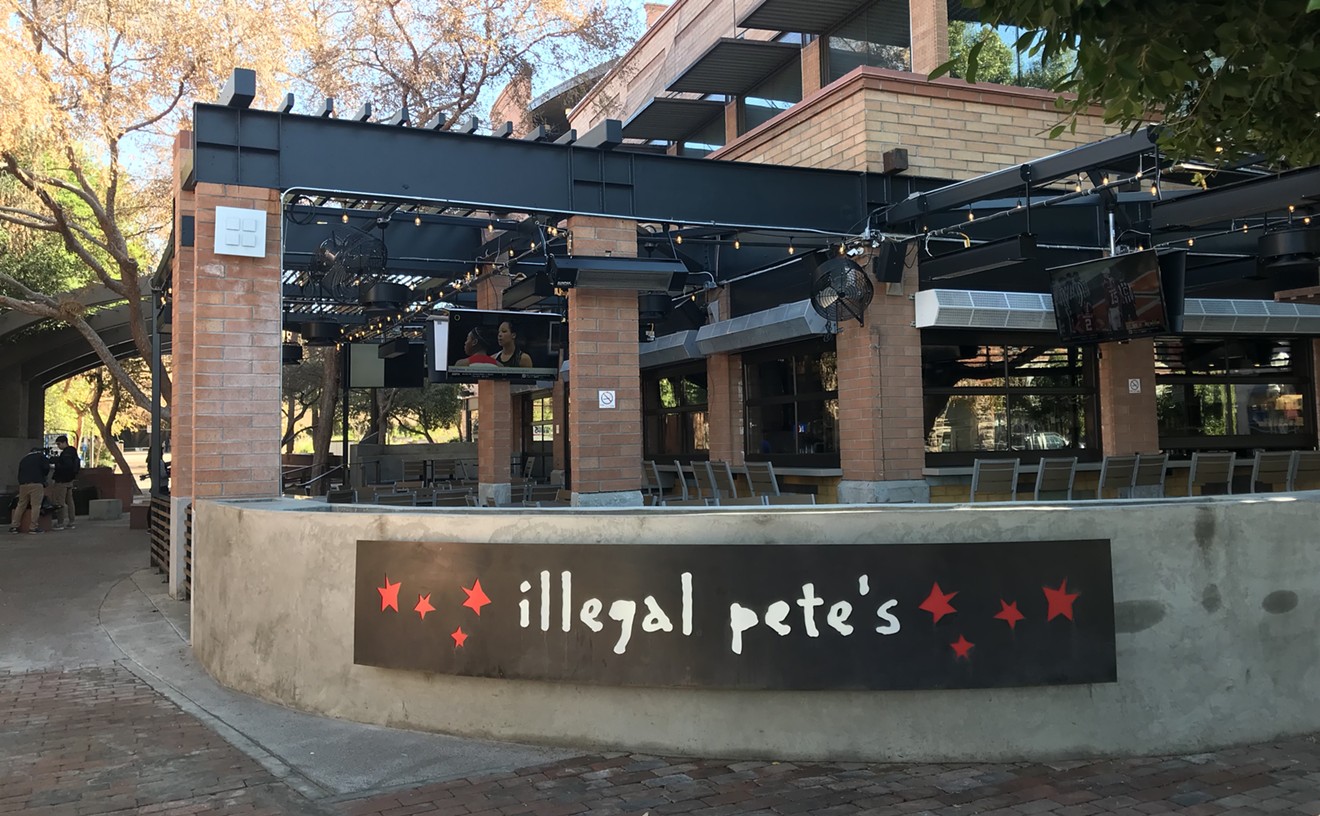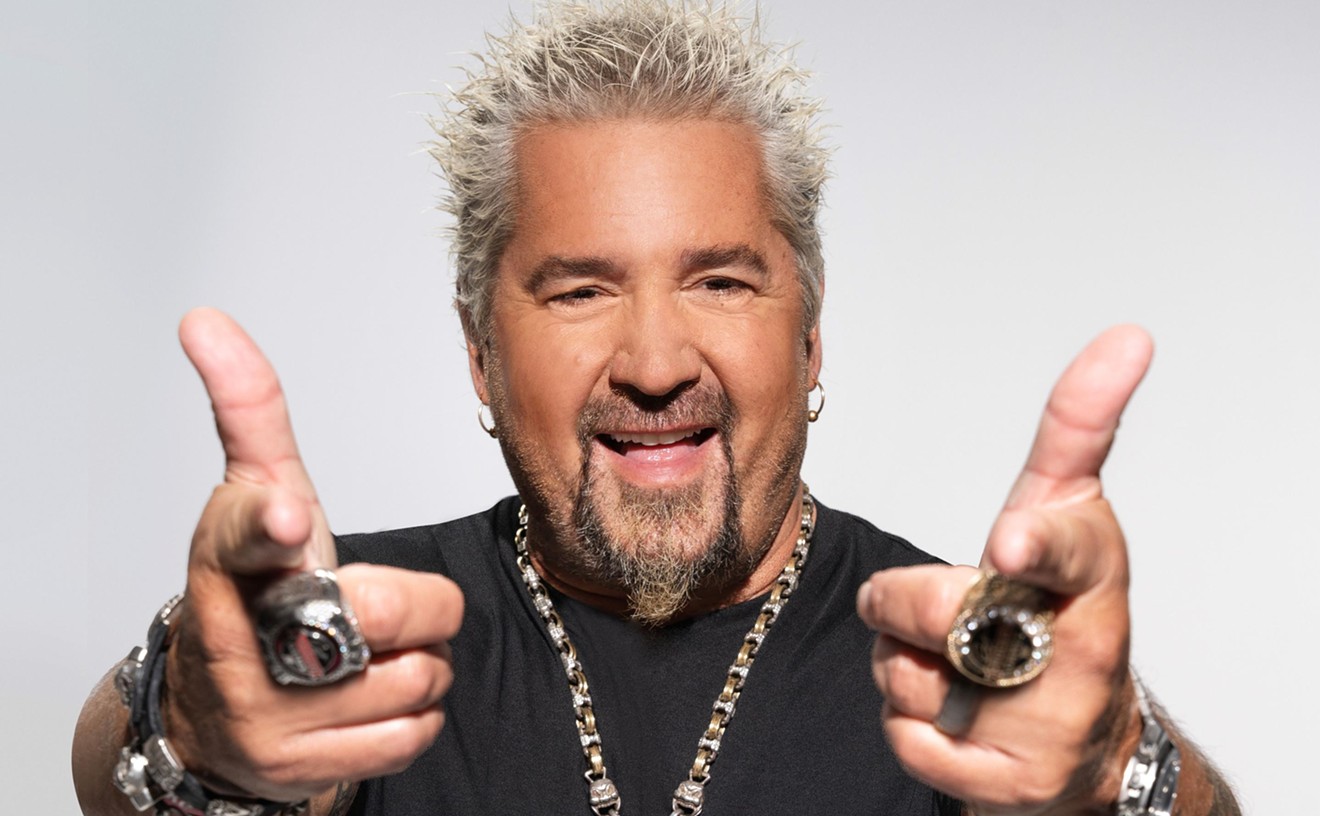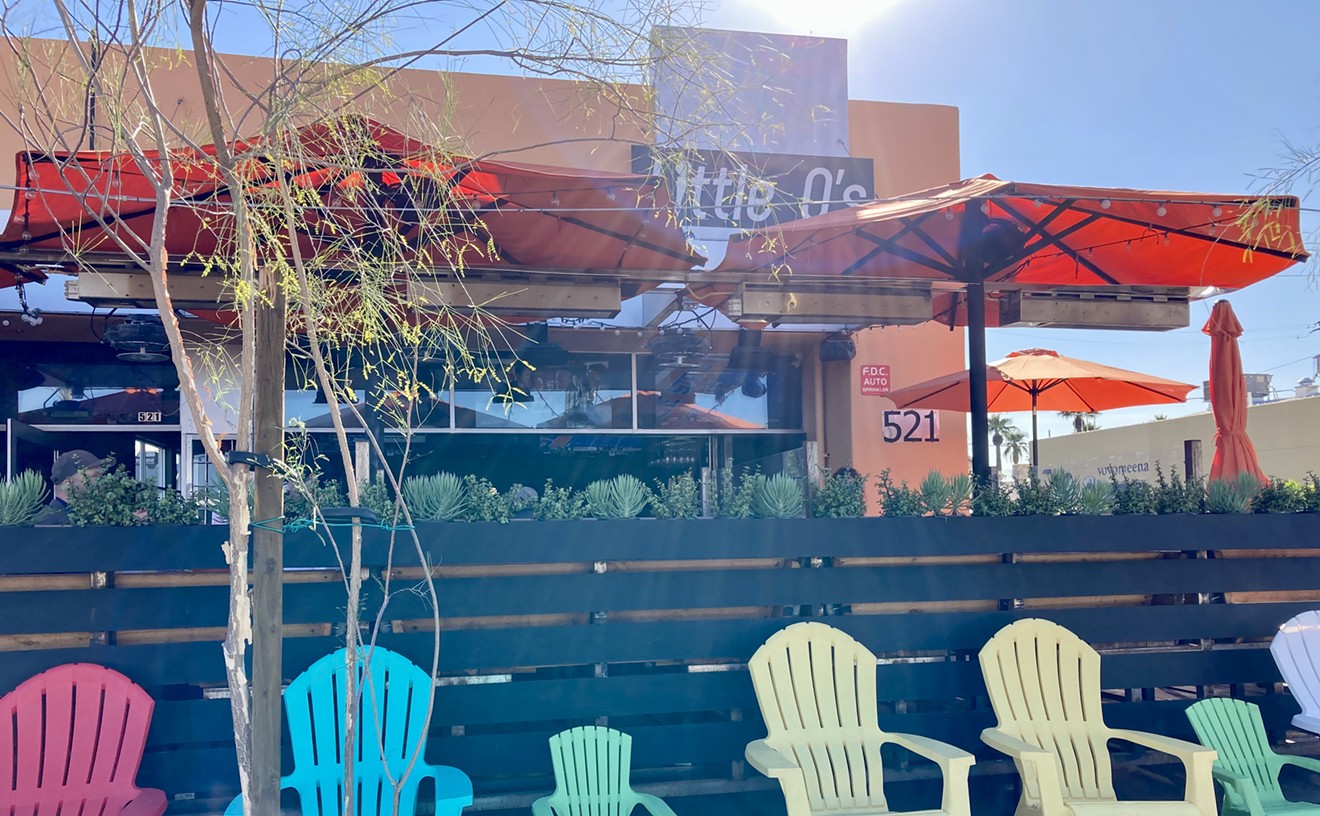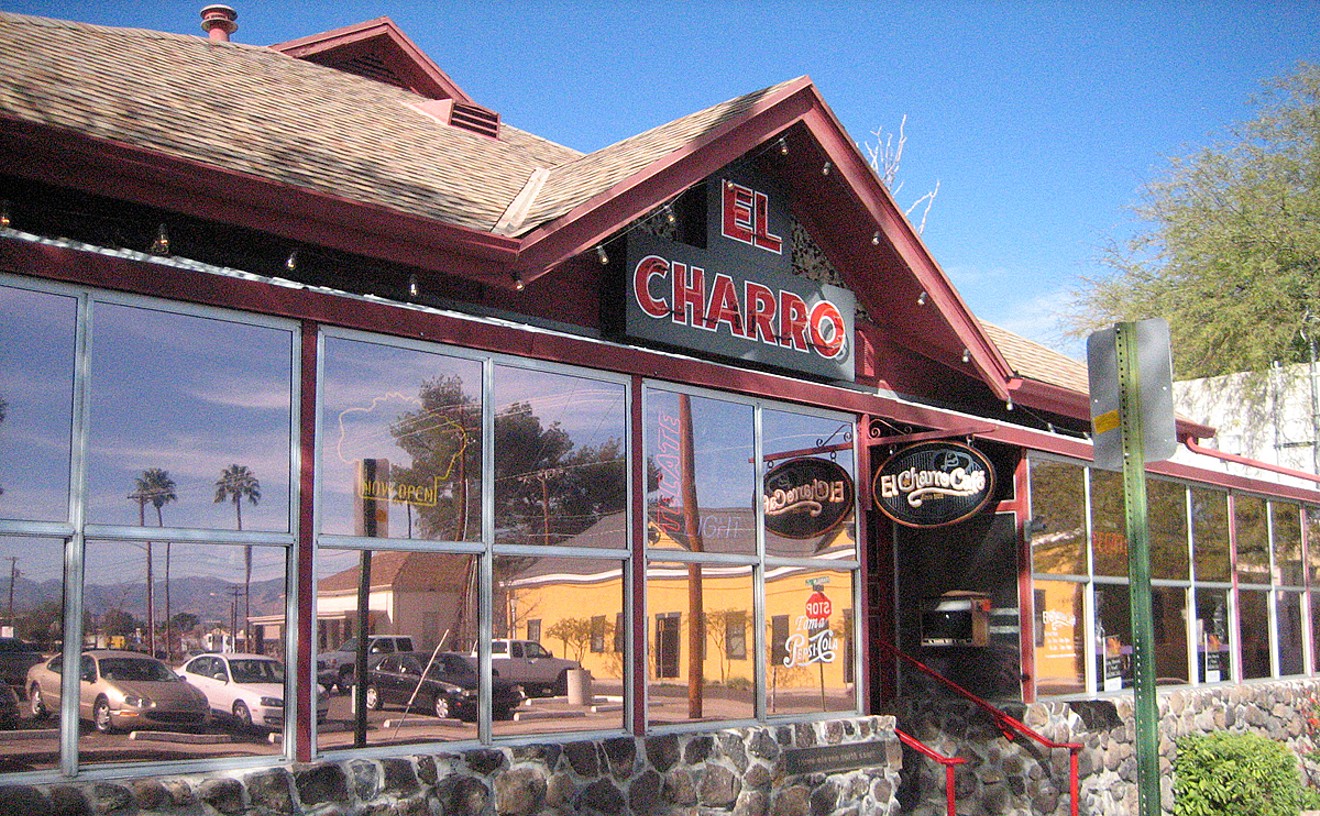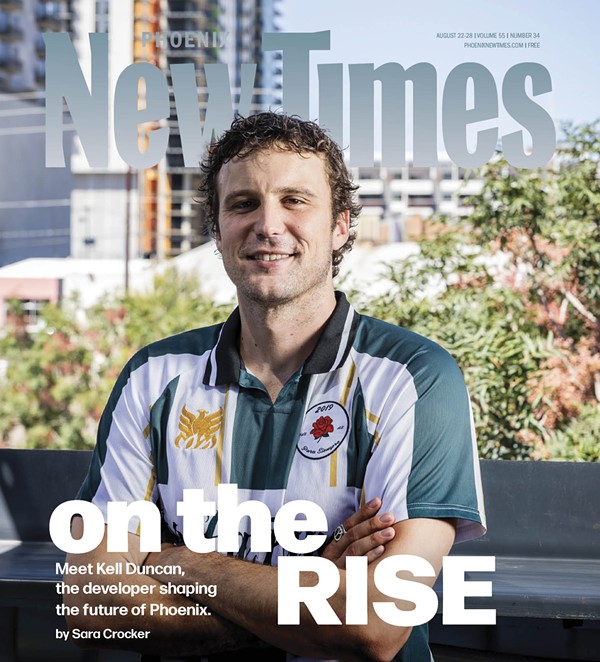Kell Duncan is OK with playing the long game. The co-founder of The Churchill bet on downtown Phoenix before it was en vogue.
“I believe in downtown. I think we’re scratching the surface,” Duncan says while sitting at one of the large wooden picnic tables in the sunken courtyard at The Churchill’s central courtyard on a sunny afternoon. “We’re a new city, we’re a young city.”
Since its debut in 2018, the dining, shopping and gathering space has become a destination for locals and visitors alike. At that time, the dining and entertainment elements of Roosevelt Row were still blossoming. The Churchill joined long-time staples such as Carly’s Bistro and Fez but was ahead of spots that are often synonymous with a night out in the area, such as Arizona Wilderness Brewing Co., Luckys Indoor Outdoor and Rough Rider, which opened in 2019, 2020 and 2021, respectively.
Duncan is a longtime downtown fan who fell in love with the area after buying a condo with his brother in the Warehouse District. Before launching The Churchill with his former business partner Hartley Rodie, Duncan worked in marketing and internet sales for a residential real estate company. The lanky 36-year-old is the first to point out that he didn’t really know what he was getting into.
“I believe in downtown. I think we’re scratching the surface,” Duncan says while sitting at one of the large wooden picnic tables in the sunken courtyard at The Churchill’s central courtyard on a sunny afternoon. “We’re a new city, we’re a young city.”
Since its debut in 2018, the dining, shopping and gathering space has become a destination for locals and visitors alike. At that time, the dining and entertainment elements of Roosevelt Row were still blossoming. The Churchill joined long-time staples such as Carly’s Bistro and Fez but was ahead of spots that are often synonymous with a night out in the area, such as Arizona Wilderness Brewing Co., Luckys Indoor Outdoor and Rough Rider, which opened in 2019, 2020 and 2021, respectively.
Duncan is a longtime downtown fan who fell in love with the area after buying a condo with his brother in the Warehouse District. Before launching The Churchill with his former business partner Hartley Rodie, Duncan worked in marketing and internet sales for a residential real estate company. The lanky 36-year-old is the first to point out that he didn’t really know what he was getting into.
“I don’t know development. I didn’t go to school for this. I majored in graphic design,” he says. But friends and supporters know that Duncan’s insight, while intangible, is valuable.
“He’s plugged into a lot of things; he knows which way the trends are headed,” says Stephen Allen, The Churchill’s director of operations.
Nearly six years in, the eye-catching gray shipping container structure on First Street, brought to life by 10 restaurants, bars and shops, has persisted while similar concepts have come and gone.
“We feel very lucky,” Duncan says. “For me, it’s more of a long-term thinking, I guess. I have the luxury and advantage that we own the land we sit on.”
That long-term thinking, along with a strident belief that small businesses working together cultivate a special type of community, has created new opportunities across the Valley for Duncan.
The developer now has three projects in the works: a downtown high-rise, restoration of an iconic Grand Avenue building and a bigger version of The Churchill in Peoria.
Though he’s quick to quip that his path and the partnerships he’s struck up have been random or unintentional, he’s acutely aware of the impact these spaces can have on the business tenants, their customers and the broader community.
“If we’re all doing well, it benefits everybody, and if we’re doing well, it benefits everyone around us,” he says. “These little drops create ripples and they overlap.”
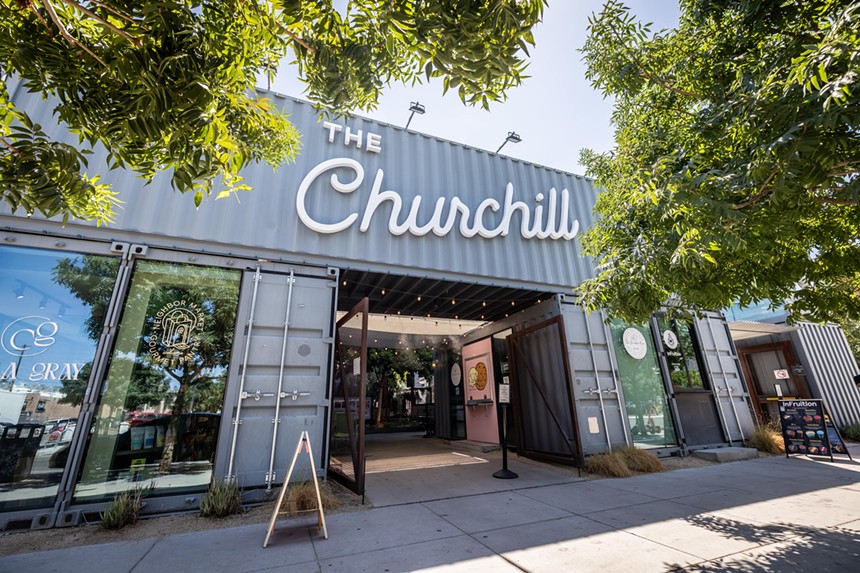
The Churchill opened near Roosevelt Row in 2018. Described as everything from a micro-mall to a food hall, the gathering place has gained a following among locals and visitors alike.
Jacob Tyler Dunn
Creating and sustaining a ‘community-motivated’ space
Duncan calls his path to co-founding The Churchill, “kind of an accident.”In 2016, he was feeling burnt out and unhappy. He left his job and began exploring opening a coworking space with a cafe. Rodie was an acquaintance through mutual friends. Knowing that Duncan lived downtown, Rodie reached out and asked for a tour of the area. During their night out, the duo talked about developments they both had in the works.
“I had my little idea that was much smaller than what he was planning; he had this really big, grand idea,” Duncan says.
It became clear they both wanted to create purposeful spaces where people could gather and launch businesses. As their conversations continued, Rodie suggested they partner up.
It was a learning process, Duncan recalls. They initially struggled to find financing and realized they needed to scale back designs for a second story and larger footprint. Duncan credits neighbors, city planners and Local Studio, The Churchill’s architect, for believing in the concept and helping the pair pivot and open the corrugated doors in 2018.
The 14,000-square-foot space includes 10 container-based businesses that encircle the courtyard. Today that roster includes Freak Brothers Pizza, smoothie bar InFruition, Hawaiian barbecue spot Loco Style Grindz, skillet cookie-centered Scookie Bar, bagel and burger shop Stoop Kid, grocery and snack vendor Neighbor Market, beauty and fragrance shop Cayla Gray, apparel brand State Forty Eight and Churchill-run bars The Brill Line and So Far So Good.
A gabled roof covers the buzzing alfresco space with views of the Phoenix sky creeping through. In the heat of the summer, the sound of fans and misters whirls above the music pumping through the sound system.
While this model of bringing together several businesses under one roof isn’t new, its operators point to their work to incubate small businesses and support the community through tenants’ “social rent” as differentiators.
“We’re not just a business, I think we are community-motivated,” Duncan says.
For its first group of tenants, the lease term was five years, with the aim of giving businesses the benefits of a brick-and-mortar location without taking on as much risk and financial investment. To meet their “social rent,” tenants also were asked to contribute time or dollars quarterly to a charity of their choice.
“We’re about community, about giving back and about putting something ahead of the bottom line,” Rodie told Phoenix New Times in 2018.
In 2020, Duncan was exploring more projects, but the pandemic disrupted those plans. With The Churchill shuttered in the early days of lockdown, he says the duo took stock and mutually agreed to part ways.
Duncan threw himself into stabilizing The Churchill and working with its tenants. He brought in Allen to lead operations. The industry veteran has worked in Los Angeles and with LGO Hospitality, the group behind popular local restaurants such as La Grande Orange and Chelsea’s Kitchen.
“We hit it off quickly,” Allen says. “Kell is such a unique guy. It’s hard to describe exactly the way that he has this ownership of looking out and trying to develop Phoenix.”
Coming out of the pandemic, Duncan and Allen worked with tenants to retool lease agreements, shortening the lease lengths, lowering the base rent and creating a collective pool for social rent to maximize the impact tenants can have as a group.
“We’re happy that we’ve been here for six years,” Duncan says. “It’s not been a normal six years either. It’s been a pretty crazy six years.”

Duncan and Stephen Allen first joined forces at The Churchill. Now the pair are teaming up for a larger project in Peoria.
Jacob Tyler Dunn
Building on The Churchill's success
With things normalizing in downtown Phoenix, an opportunity in Peoria presented itself.The West Valley city hopes to revitalize its historic downtown and tapped Duncan and Allen, along with brothers Gavin and Lance Linderman, owners of Driftwood Coffee and Easy Tiger bar, to curate a larger Churchill-esque space called Jefferson House.
It’s a bit of a homecoming for Duncan, who was raised in Goodyear and attended Agua Fria High School in Avondale.
“I’ve always had a soft spot for the West Valley,” Duncan says.
It’s where his parents built their business, Duncan Family Farms, from a few hundred acres of crops into a multistate organic growing operation that employs hundreds of people.
“It’s been pretty amazing,” Duncan says of watching that growth. And the admiration goes both ways. His father, Arnott Duncan, says he’s “in awe” of what his son has built.
“I couldn’t be more proud of him for being that guy that everybody trusts to do something special with. The key there is trust,” Arnott says.
Arnott also credits Duncan’s affability and desire to help connect others, regardless of how it may benefit him.
“He’s very interested in people at a foundational level,” he says.
Allen echoes Arnott.
“His thought process and how he develops generally starts with how it can benefit somebody else or a group of people or a community," Allen says. "That takes a lot more effort than to just say, 'I want to build a business that’s successful.’”
With the Jefferson House, Duncan and Allen can apply and expand on their experience at The Churchill.
“It gives us an opportunity to create a foundation of what we’ve already learned here,” Allen says. “It’s going to be more impactful to the community.”
The new venue will offer plenty of similarities to the Roosevelt Row gathering space. Jefferson House will be built from repurposed shipping containers, harking back to the location’s rail yard history. And when it comes to selecting tenants, the focus will remain on incubating local businesses and include social rent as part of their lease terms.
But, it’s also a chance for the team to go bigger than they ever could at The Churchill thanks to a site about one-third larger. Designs are still in development, but Duncan hopes to make Jefferson House two stories, featuring office space in addition to shops, restaurants and bars.
“This opportunity is really cool, not only to give business over there a shot but also just have people be able to go to a place and experience multiple small businesses and bring everyone together,” Duncan says.
The team is working on ways to improve climate control in an open-air building, and they concede that summers are challenging, even with discounts and special events to entice people to visit.
“It’s hard to have eight good months and lose your ass for four and break even. That’s a bummer,” Duncan says.
At the Jefferson House, they hope to do more to make the space one for all seasons, focusing on elements such as a kid-friendly splash pad in the courtyard and creating effective shading.
“That’s going to be a major focus,” Allen says. “This is going to be a year-round thing.”
With the construction timeline in the hands of the city, Duncan and Allen are hesitant to commit to an opening date but are currently interviewing prospective tenants. 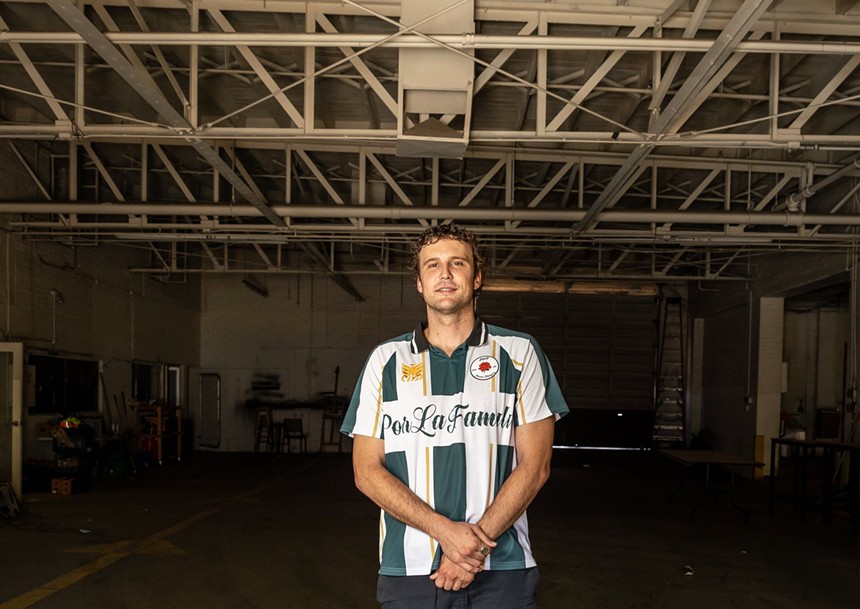
The first, located on Central Avenue and Garfield Street, can be seen from The Churchill’s rooftop.
Duncan had eyed the former U-Haul building for a dining, arts and market space. He was supposed to close on the sale in March 2020 but scrapped those plans when the pandemic hit.
“Covid just threw a wrench into everything. I still wanted to buy the building because I believed, in that long-term, (it) was a good investment,” Duncan says.
He reached out to David Warren of Mainstreet Capital Partners, someone he'd met after The Churchill initially opened. Warren has developed projects in Phoenix, including Camelback Lakes, a Biltmore office center. When Duncan approached him looking for a partner, Warren and Mainstreet Capital agreed.
“They kind of took a chance on me,” Duncan says.
The development will be a new 30-story, 325-foot high-rise with around 250 apartments. Duncan will curate the food and retail on the two main floors, and Mainstreet Capital Partners will manage everything above that.
The first two floors will include a seasonally inspired restaurant and bar, lobby cafe and a boutique grocery with local produce. All three concepts will source “from not only my family’s farm but any other small family farm that we can pull from,” Duncan says.
Duncan hopes the market also will serve local chefs by hosting first-pick hours, where the market opens for cooks before the general public has access. The restaurant and bar also will showcase prime ingredients.
“I really want the restaurant to function as an educational thing of why produce is seasonal,” Duncan says.
Though no timeline for groundbreaking has been set, Duncan says he and Warren are targeting an opening in 2027. The new development will help increase density in an area chopped up by vacant buildings and lots.
“I love that we’re continuing to fill that in and have it be very walkable,” he says.
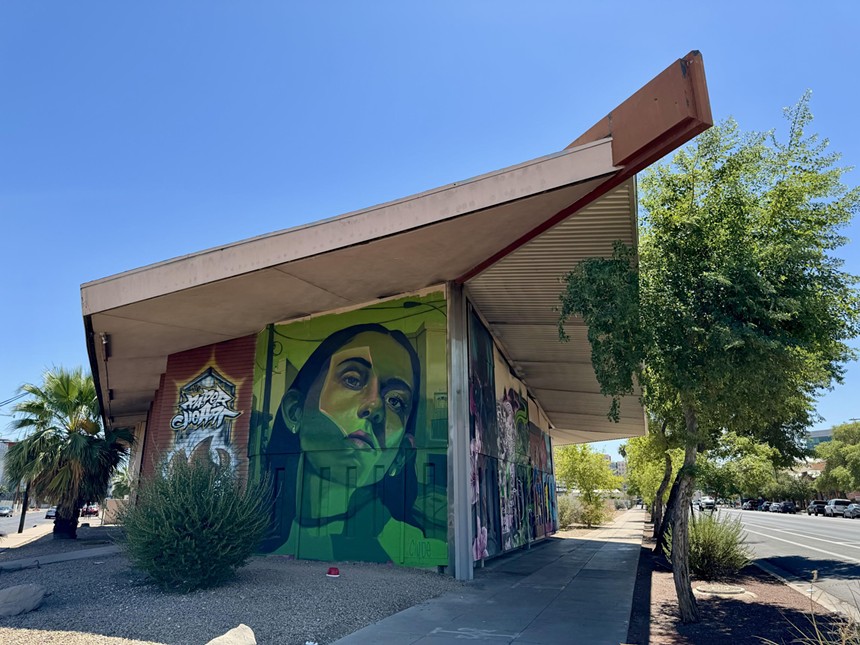
Expanding to Grand Avenue
While Duncan is disappointed that the former U-Haul building on Central Avenue will be demolished, he plans to preserve another building for his third downtown project.
He, in partnership with McKinley Club owners Celine and Kevin Rille, plans to restore the historic Paper Heart building located on Grand Avenue and Polk Street. Designed by architect Victor Gruen with Ralph Haver and built in 1954, the building has lived several lives, as a car dealership, venue and exhibition space, before it caught fire in 2021. The trio took on the property in 2022.
“We loved the old, historic building,” Duncan says. “We both had the interest in, long-term, we want to save the building.”
While these projects are still in their early stages, Duncan points out all the cranes circling the downtown area as harbingers of more change to come.
“What I’ve seen in five years, from when we started to where we’re at now, is pretty crazy,” Duncan says. ”And I think five years from now, it could be even crazier.”
He knows patience is key.
“That kind of gets me back into the long-term style of thinking and why I don’t try to get too hung up on the highs and lows now, but I really believe in where we’re going in 10, 20 years,” he says.
As a number of neighboring restaurants, bars and businesses have grown around The Churchill and some of its tenants have graduated to their own brick-and-mortar spaces, Duncan is energized.
“There’s just a lot of really talented people doing really cool and fun projects,” he says. “I’m more of a Phoenix-first approach, where it’s us against everybody else. I don’t view anyone else down here as competition other than friendly and healthy.”
And, he sees the potential for that energy to grow, not just across downtown, but across the Valley.
“I love community building, is what I think I’ve discovered through this process,” Duncan says. “I just love the opportunity to have my fingerprints and have an impact on a young city. That’s what I want to do even more.”
“It gives us an opportunity to create a foundation of what we’ve already learned here,” Allen says. “It’s going to be more impactful to the community.”
The new venue will offer plenty of similarities to the Roosevelt Row gathering space. Jefferson House will be built from repurposed shipping containers, harking back to the location’s rail yard history. And when it comes to selecting tenants, the focus will remain on incubating local businesses and include social rent as part of their lease terms.
But, it’s also a chance for the team to go bigger than they ever could at The Churchill thanks to a site about one-third larger. Designs are still in development, but Duncan hopes to make Jefferson House two stories, featuring office space in addition to shops, restaurants and bars.
“This opportunity is really cool, not only to give business over there a shot but also just have people be able to go to a place and experience multiple small businesses and bring everyone together,” Duncan says.
The team is working on ways to improve climate control in an open-air building, and they concede that summers are challenging, even with discounts and special events to entice people to visit.
“It’s hard to have eight good months and lose your ass for four and break even. That’s a bummer,” Duncan says.
At the Jefferson House, they hope to do more to make the space one for all seasons, focusing on elements such as a kid-friendly splash pad in the courtyard and creating effective shading.
“That’s going to be a major focus,” Allen says. “This is going to be a year-round thing.”
With the construction timeline in the hands of the city, Duncan and Allen are hesitant to commit to an opening date but are currently interviewing prospective tenants.

Duncan stands inside the former Uhaul building that is set to become a high-rise. Duncan will oversee the first two floors, with plans for a seasonal restaurant, lobby cafe and organic grocery store.
Jacob Tyler Dunn
Restoring and scaling up downtown
Back in downtown Phoenix, Duncan has two additional projects in the works.The first, located on Central Avenue and Garfield Street, can be seen from The Churchill’s rooftop.
Duncan had eyed the former U-Haul building for a dining, arts and market space. He was supposed to close on the sale in March 2020 but scrapped those plans when the pandemic hit.
“Covid just threw a wrench into everything. I still wanted to buy the building because I believed, in that long-term, (it) was a good investment,” Duncan says.
He reached out to David Warren of Mainstreet Capital Partners, someone he'd met after The Churchill initially opened. Warren has developed projects in Phoenix, including Camelback Lakes, a Biltmore office center. When Duncan approached him looking for a partner, Warren and Mainstreet Capital agreed.
“They kind of took a chance on me,” Duncan says.
The development will be a new 30-story, 325-foot high-rise with around 250 apartments. Duncan will curate the food and retail on the two main floors, and Mainstreet Capital Partners will manage everything above that.
“The nice part is they loved the concepts,” Duncan says. “For them, it makes a lot of sense because a lot of times the retail is an afterthought. This was backwards. We already had the concept for the downstairs, and who wouldn’t want to live above an organic grocery market and restaurant?”
The first two floors will include a seasonally inspired restaurant and bar, lobby cafe and a boutique grocery with local produce. All three concepts will source “from not only my family’s farm but any other small family farm that we can pull from,” Duncan says.
Duncan hopes the market also will serve local chefs by hosting first-pick hours, where the market opens for cooks before the general public has access. The restaurant and bar also will showcase prime ingredients.
“I really want the restaurant to function as an educational thing of why produce is seasonal,” Duncan says.
Though no timeline for groundbreaking has been set, Duncan says he and Warren are targeting an opening in 2027. The new development will help increase density in an area chopped up by vacant buildings and lots.
“I love that we’re continuing to fill that in and have it be very walkable,” he says.

Duncan, in partnership with McKinley Club owners Celine and Kevin Rille, will restore the historic Paper Heart building on Grand Avenue and Polk Street.
Sara Crocker
Expanding to Grand Avenue
While Duncan is disappointed that the former U-Haul building on Central Avenue will be demolished, he plans to preserve another building for his third downtown project.He, in partnership with McKinley Club owners Celine and Kevin Rille, plans to restore the historic Paper Heart building located on Grand Avenue and Polk Street. Designed by architect Victor Gruen with Ralph Haver and built in 1954, the building has lived several lives, as a car dealership, venue and exhibition space, before it caught fire in 2021. The trio took on the property in 2022.
The 8,800-square-foot space will include a studio, gallery and store to sell artworks, as well as a restaurant and bar. The aim, Duncan says, is to preserve the Paper Heart to create and celebrate art in an area where it’s become more challenging for artists to live and work.
“We loved the old, historic building,” Duncan says. “We both had the interest in, long-term, we want to save the building.”
While these projects are still in their early stages, Duncan points out all the cranes circling the downtown area as harbingers of more change to come.
“What I’ve seen in five years, from when we started to where we’re at now, is pretty crazy,” Duncan says. ”And I think five years from now, it could be even crazier.”
He knows patience is key.
“That kind of gets me back into the long-term style of thinking and why I don’t try to get too hung up on the highs and lows now, but I really believe in where we’re going in 10, 20 years,” he says.
As a number of neighboring restaurants, bars and businesses have grown around The Churchill and some of its tenants have graduated to their own brick-and-mortar spaces, Duncan is energized.
“There’s just a lot of really talented people doing really cool and fun projects,” he says. “I’m more of a Phoenix-first approach, where it’s us against everybody else. I don’t view anyone else down here as competition other than friendly and healthy.”
And, he sees the potential for that energy to grow, not just across downtown, but across the Valley.
“I love community building, is what I think I’ve discovered through this process,” Duncan says. “I just love the opportunity to have my fingerprints and have an impact on a young city. That’s what I want to do even more.”

